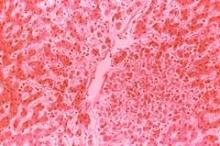Keep dengue fever on the differential of acute flulike illness, investigators advised in the Jan. 24 Morbidity and Mortality Weekly Report following the death of a 63-year-old Texas woman from hemophagocytic lymphohistiocytosis that was triggered by dengue virus infection.
It was the third death from dengue virus infection apparently acquired in the United States. Americans usually pick up the virus from travel to tropical areas, where it’s endemic. All three cases were geographically associated with Texas, the investigators said (MMWR 2014;63:50-4).
"This case underscores the need for clinicians in the United States to be vigilant for dengue and request diagnostic testing for suspected cases, which should be reported to public health authorities. Because of nonspecific signs and symptoms, such cases can be misdiagnosed as influenza, WNV [West Nile virus] infection, or another common acute febrile illness. Competent DENV [dengue virus] vectors are present in most states, and importation of DENV via travelers has resulted in recent dengue outbreaks in Florida, Hawaii, and Texas," said investigators, led by Tyler Sharp, Ph.D., of the Centers for Disease Control and Prevention.
The woman was initially diagnosed with WNV after returning to Texas feverish with fatigue, headache, and other problems that started during an Aug. 2012 vacation to Santa Fe, N.M.
Her serology at the time was weakly positive for WNV infection probably, in retrospect, from a cross-reaction with dengue virus antibodies.
She grew worse and was hospitalized Sept. 22. Shortly thereafter, she was diagnosed with virus-induced hemophagocytic lymphohistiocytosis that necessitated a bone marrow biopsy. She developed pancytopenia, liver failure, and disseminated intravascular coagulopathy, and died Oct. 3.
About a month later, DENV-3 was detected in her bone marrow biopsy. "Erythrophagocytosis was evident," the investigators said.
Aedes aegypti and other DENV-carrying mosquitoes are rare in Santa Fe because of the elevation. It’s possible "an imported mosquito might have survived in the warmer August climate, fed on a DENV-infected person, and subsequently infected the patient," they said.
Eighteen people from Texas donated blood to her before the biopsy, so it’s also possible she picked up the virus from contaminated blood, a rare route of transmission.
However, none of the donors reported fever in the weeks before or the week after donating blood, and none of the 14 tested afterward had evidence of dengue infection.
The woman had Crohn’s disease and was taking an immunosuppressive, both of which increase the risk for HLH, a hyperinflammatory syndrome following strong immune system activation. Epstein-Barr virus is a common trigger, but dengue is not. There have been 27 documented cases since 1966, 8 of which were fatal. MMWR’s case is the first reported in the United States.
The woman attended a craft show in Santa Fe, went for regular walks, and spent most evenings on the patio. Her traveling companions remained healthy and tested negative for infection. The woman had been to France earlier in the year.
From 2001 to 2007, a total of 796 cases of dengue fever were reported in the United States, most of which were imported. About 95% of people develop acute febrile illness, but not more serious complications.
The investigation funding source and investigator disclosures were not included in the report.


